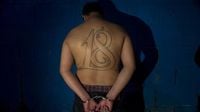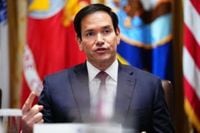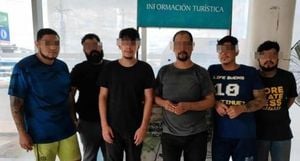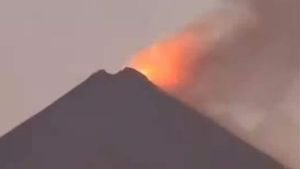The United States government, under President Donald Trump, has officially designated the notorious Barrio 18 gang as a foreign terrorist organization (FTO) and a Specially Designated Global Terrorist (SDGT), marking a dramatic escalation in Washington’s ongoing campaign against transnational criminal groups in the Western Hemisphere. The move, announced on September 23, 2025, by Secretary of State Marco Rubio, signals a new phase in the Trump administration’s efforts to disrupt the operations and revenue streams of violent gangs that have long plagued Central America and, by extension, U.S. communities.
Barrio 18, also known as 18th Street, is one of the largest and most violent gangs in the Northern and Western Hemispheres. Its roots stretch back to Los Angeles in the 1960s, when young Salvadoran immigrants formed the gang as a means of protection in the city’s tough neighborhoods. Over the decades, the gang’s membership ballooned, particularly after mass deportations of members from the United States to Central America. Today, Barrio 18 is a dominant force in El Salvador, Guatemala, and Honduras, with an estimated 50,000 members, according to a U.S. Justice Department statement cited by UPI and other outlets.
The gang’s influence is felt most acutely in Central America, where it has been responsible for brutal attacks against security personnel, public officials, and civilians. According to the State Department, Barrio 18’s activities include drug trafficking, extortion, and a range of other illicit enterprises that finance its violent operations. Secretary of State Rubio emphasized the threat posed by the gang, stating, “The United States will continue to protect our nation by keeping illicit drugs off our streets and disrupting the revenue streams funding the violent and criminal activity of vicious gangs and drug cartels.”
This latest designation means that providing material support to Barrio 18 is now a federal crime in the U.S., and any assets the gang holds under U.S. jurisdiction will be frozen. The move also bars members of Barrio 18 from entering the United States and gives law enforcement broader tools to prosecute and disrupt the gang’s activities. The designation, made under Section 219 of the Immigration and Nationality Act and Executive Order 13224, took effect upon publication in the Federal Register, as reported by multiple sources including UPI and the Justice Department.
President Trump, who has made combating gangs and toughening immigration policies central themes of his administration, praised this action as a fulfillment of his promises. During a speech at the United Nations General Assembly on the day of the announcement, Trump thanked El Salvador’s President Nayib Bukele for his efforts in jailing criminals, stating, “for the successful and professional job they have done in receiving and jailing so many criminals that entered our country.” Bukele’s government, which did not immediately respond to requests for comment, has itself waged a fierce campaign against gangs, imprisoning more than 1% of El Salvador’s population for alleged gang ties. While this crackdown has led to a sharp drop in crime rates, it has also drawn widespread criticism for alleged human rights abuses, including detentions with little evidence and limited access to due process, as reported by multiple outlets.
The Trump administration’s approach to transnational crime has included not only the designation of gangs as terrorist organizations but also an expansion of military actions in the region. In recent months, U.S. forces have fired on boats in the Caribbean suspected of carrying drugs destined for the United States, resulting in several fatalities. This aggressive stance has ruffled feathers in Latin America and has been met with both support and concern from regional governments and human rights advocates.
Barrio 18 now joins a growing list of criminal organizations labeled as foreign terrorist organizations by the Trump administration. Other groups include its longtime rival, Mara Salvatrucha (MS-13), the Venezuelan gang Tren de Aragua, and major Mexican cartels such as the Sinaloa Cartel and the Jalisco New Generation Cartel. Traditionally, the FTO designation has been reserved for groups with overtly political or ideological motives. However, as The Washington Post and other outlets have noted, these Latin American gangs are primarily motivated by financial gain, engaging in drug trafficking, extortion, and other crimes, even as they sow terror in the communities they control.
The rivalry between Barrio 18 and MS-13, both of which originated in Los Angeles before spreading across Central America, remains one of the most violent and persistent in the region. According to a Justice Department-funded study cited in recent coverage, “Hatred of the Barrio 18 is the glue that holds the MS-13 together.” This feud has fueled countless acts of violence, including a deadly attack by MS-13 gunmen at a Barrio 18 member’s funeral in Guatemala earlier this year, leaving at least seven dead and 13 wounded.
For the Trump administration, the new designation is intended to cripple Barrio 18’s ability to operate, both financially and operationally. As Secretary Rubio put it, the measures are “designed to cripple the organization’s ability to operate and protect the American public from its reach.” The State Department underscored that U.S. persons are now barred from providing any material support or doing business with the gang, and any property or assets linked to Barrio 18 will be blocked or frozen.
This move comes amid a broader crackdown on gangs and immigration. Since January 2025, nearly a dozen criminal gangs have been designated as terrorist organizations, reflecting the administration’s hard line on both crime and border security. Yet, the effectiveness of these designations in curbing violence or drug trafficking remains to be seen. Critics argue that while such measures may disrupt some operations, they can also drive criminal groups further underground or complicate international cooperation, especially when human rights concerns are at play.
For communities in El Salvador, Guatemala, and Honduras, the designation is both a signal of U.S. resolve and a reminder of the complex, often tragic history that has shaped the region’s gang violence. Many of the gang’s original members were deported from the U.S. after fleeing civil wars in Central America, only to find themselves at the heart of new cycles of violence and poverty. As the U.S. ramps up pressure on groups like Barrio 18, the real challenge may lie in addressing the root causes of gang membership and migration—issues that defy easy solutions or quick fixes.
With the designation now in effect, law enforcement agencies in the U.S. and Central America face the daunting task of translating new legal tools into real-world impact. Whether this latest move will bring lasting change or simply escalate an already bloody struggle remains to be seen, but for now, the Trump administration has made clear that it intends to use every tool at its disposal to fight the scourge of transnational gangs.





